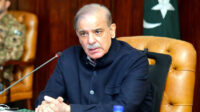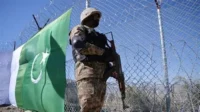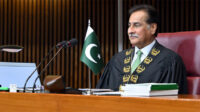Assalaam-o-Alaikum and Welcome to the Weekly Press Briefing at the Foreign Office
Let me begin with an overview of the recent foreign policy related developments.
Foreign Minister Makhdoom Shah Mahmood Qureshi held a telephone conversation with his Azerbaijani counterpart Jeyhun Bayramov.
The two Ministers discussed bilateral relations and the ongoing conflict between Azerbaijan and Armenia on Nagorno-Karabakh region.
Foreign Minister Qureshi expressed deep concern on the deteriorating security situation in Nagorno-Karabakh and expressed full solidarity with the brotherly nation of Azerbaijan.
Foreign Minister Bayramov appreciated Pakistan’s consistent support to Azerbaijan and briefed on the latest situation in the region.
Foreign Minister Shah Mahmood Qureshi held a meeting with the UN Secretary General’s Special Representative for Afghanistan and Head of the UN Assistance Mission in Afghanistan (UNAMA), Deborah Lyons.
The Foreign Minister highlighted Pakistan’s facilitative role in the Afghan Peace Process, which was duly acknowledged by the international community. He also underscored the range of steps taken by Pakistan to support Afghanistan in transit trade and movement of people, despite the challenges posed by COVID-19 pandemic.
Reaffirming Pakistan’s commitment for safe and dignified return of the Afghan refugees to their homeland, the Foreign Minister urged UNAMA to play an active role in helping with time-bound and well-resourced refugee return and their sustainable reintegration in the Afghan society.
In a virtual meeting with the Saudi Minister for Communications and IT, Foreign Minister Qureshi underlined the historic and deep-rooted fraternal ties between Pakistan and Saudi Arabia, which form the basis of enhanced cooperation in all fields between the two countries.
The Foreign Minister underscored the wide-ranging scope for further strengthening existing fraternal ties and enhancing cooperation in multiple areas, including Information Technology.
Terming Pakistan as a close brotherly country, the Saudi Minister reciprocated the warm feelings and reiterated the need to enhance cooperation, particularly in the field of Communication and Information Technology.
Leader of Hezb-e-Islami Afghanistan, Gulbuddin Hekmatyar, along with a delegation, visited Pakistan from 19-21 October 2020.
During his visit, Mr. Hekmatyar called on the Prime Minister and the President and met with the Chairman Senate, Speaker National Assembly, Foreign Minister and other dignitaries.
The visit of Mr. Hekmatyar provided an opportunity for exchange of views on the Afghan Peace Process and strengthening of Pakistan-Afghanistan bilateral relations.
In his meeting with Mr. Hekmatyar, Prime Minister Imran Khan reiterated his long-standing position that there was no military solution to the conflict in Afghanistan and that an Afghan-led and Afghan-owned peace process was the only way forward.
Noting that Intra-Afghan Negotiations provided a historic opportunity for the Afghan leadership to establish lasting peace, the Prime Minister underlined the positive contribution made by Pakistan in facilitating the Afghan Peace Process.
The Prime Minister also warned against the damaging role of ‘spoilers’, within and outside Afghanistan.
Referring to the enormous potential in bilateral trade, the Prime Minister reaffirmed Pakistan’s full support for Afghanistan on the path of reconstruction and economic development and dignified return of Afghan refugees.
Mr. Hekmatyar appreciated Pakistan’s positive role in facilitating the Afghan Peace Process and also thanked Pakistan for its long-standing contribution to the socio-economic development of Afghanistan.
He also thanked Pakistan for hosting millions of Afghan refugees for more than four decades.
Speaking at a think-tank in Islamabad, Mr. Hekmatyar condemned the worsening human rights violations and atrocities against innocent people in IIOJK.
He stressed that the Jammu and Kashmir dispute should be resolved as per the wishes of the Kashmiri people.
Foreign Secretary Sohail Mahmood inaugurated the Center for Middle East and Africa (CMEA) at the Institute of Strategic Studies (ISSI) in Islamabad.
On the occasion, the Foreign Secretary emphasized the political, economic and strategic importance of the Middle East and Africa.
Recalling Pakistan’s warm and cordial ties with the countries of the region, the Foreign Secretary reaffirmed Pakistan’s keen desire to further enhance bilateral ties by deepening and diversifying areas of cooperation with African and Middle Eastern countries.
In this regard, he also apprised the participants of Pakistan’s “Engage Africa” Initiative.
Coming to the situation in Indian Illegally Occupied Jammu and Kashmir (IIOJK), the inhuman military siege, brutal oppression, communications blockade and media blackout in IIOJK continue unabated for 444 days since India’s illegal and unilateral actions of 5th August 2019.
In brazen manifestation of state terrorism, Indian occupation forces, in the past few days, martyred 5 more innocent Kashmiri youth during the so-called “cordon and search” operations and fake encounters in Anantnag, Shopian and Pulwama areas of IIOJK.
In the month of October alone, 18 unarmed and innocent Kashmiris have been martyred by the Indian occupation troops.
During the same period, over 40 young Kashmiris were severely injured due to unprovoked and indiscriminate use of live ammunition, pellet guns and other military grade weapons.
These illegal Indian actions are a clear violation of the UN Basic Principles on the Use of Force and Firearms by Law Enforcement Officials and the UN Code of Conduct for Law Enforcement Officials.
The Indian occupation forces also arrested over 60 young Kashmiris on frivolous charges.
Many of those detained are kept at undisclosed locations, away from their families.
The instances of forced disappearances also remain rampant.
Pakistan continues to highlight the grim human rights situation in IIOJK at all relevant international forums, including the United Nations, and the human rights and humanitarian organizations.
While taking part in dialogue with the UN High Commissioner for Human Rights, Michelle Bachelet, at the 3rd Committee of the UN General Assembly in New York, Pakistan urged the international community to demand India to halt its egregious violations of human rights in IIOJK, including their right to self-determination
Pakistan also called upon India to implement the recommendations of the two reports of the UN Human Rights Commissioner on Kashmir issued in 2018 and 2019.
Pakistan strongly supported the establishment of the Commission of Inquiry and fact-finding missions for territories under foreign occupations to investigate and preserve evidence for ensuring accountability of the perpetrators of grave human right violations.
The continued crackdown against minorities, human rights organizations, media, and independent voices in India is a matter of grave concern.
Voices from around the world continue to condemn the gross human rights violations and unprecedented restrictions in IIOJK and India.
In her recent statement (20 October 2020), UN High Commissioner for Human Rights Michele Bachelet has once again called the Human Rights credentials of the current RSS-BJP regime into question by expressing concerns over the arrest of hundreds of human rights activists and restriction on the work of human rights bodies.
The High Commissioner stated that more than 1,500 people have reportedly been arrested in relation to the protests, with many charged under the Unlawful Activities Prevention Act – a law which has also been widely criticized for its lack of conformity with international human rights standards.
Pakistan has been consistently underscoring the lack of conformity with international human rights standards of other draconian laws such as Armed Forces Special Powers Acts (AFSPA) and the Public Safety Act (PSA).
In continued attempts to muzzle independent media, the Indian authorities have sealed the offices of leading English language dailies, ‘Kashmir Times’, and ‘Kashmir News Service’.
The International Federation of Journalists (IFJ) in Asia-Pacific has expressed its deep concerns over such kind of intimidation of independent media voices in IIOJK.
In his statement at a recent think tank event, the Indian External Affairs Minister sadly blamed Pakistan for the current state of Pakistan-India relations.
Pakistan strongly condemns the blatantly misrepresentative statement by the Indian Minister.
Such statements make it is immediately obvious that the current Indian leadership has limited its conduct of foreign policy to baseless allegations and belligerent rhetoric.
It is the RSS-BJP regime’s dangerous policies of ‘Hindutva’ and ‘Akhand Bharat’ that continue to create problems with nearly all of India’s neighbours.
India must realize that ‘normal’ relations with its neighbours remain contingent upon India beginning to act normally.






